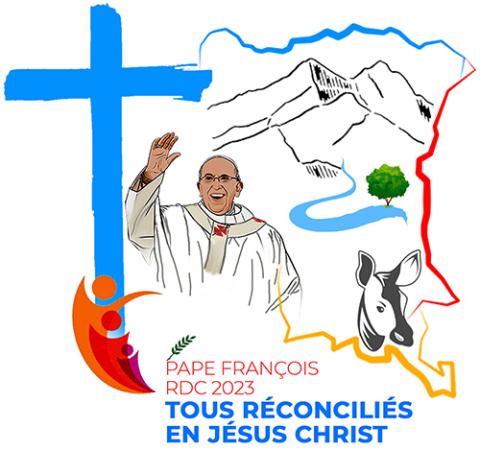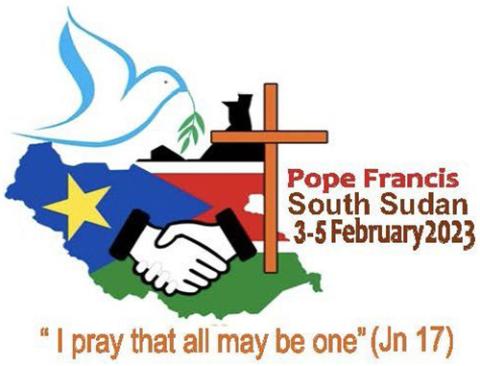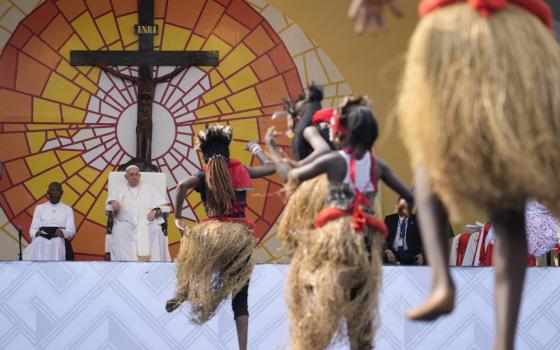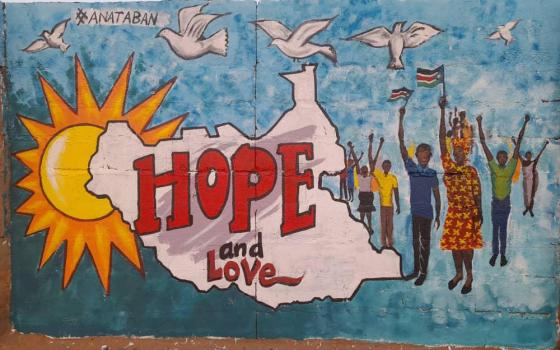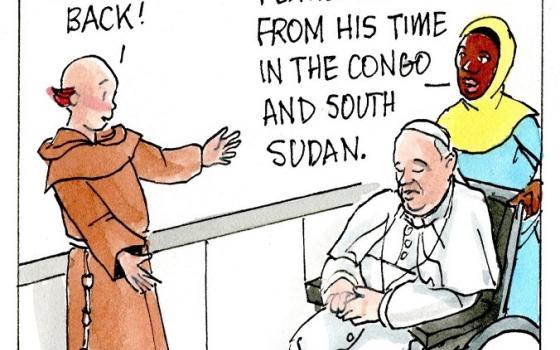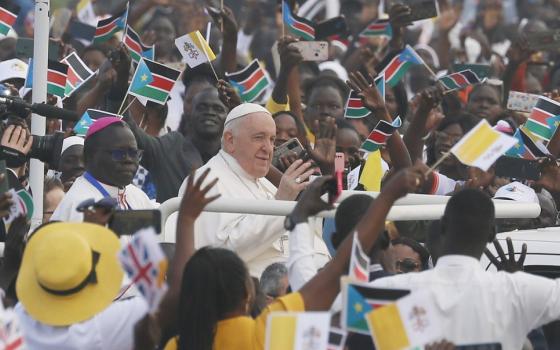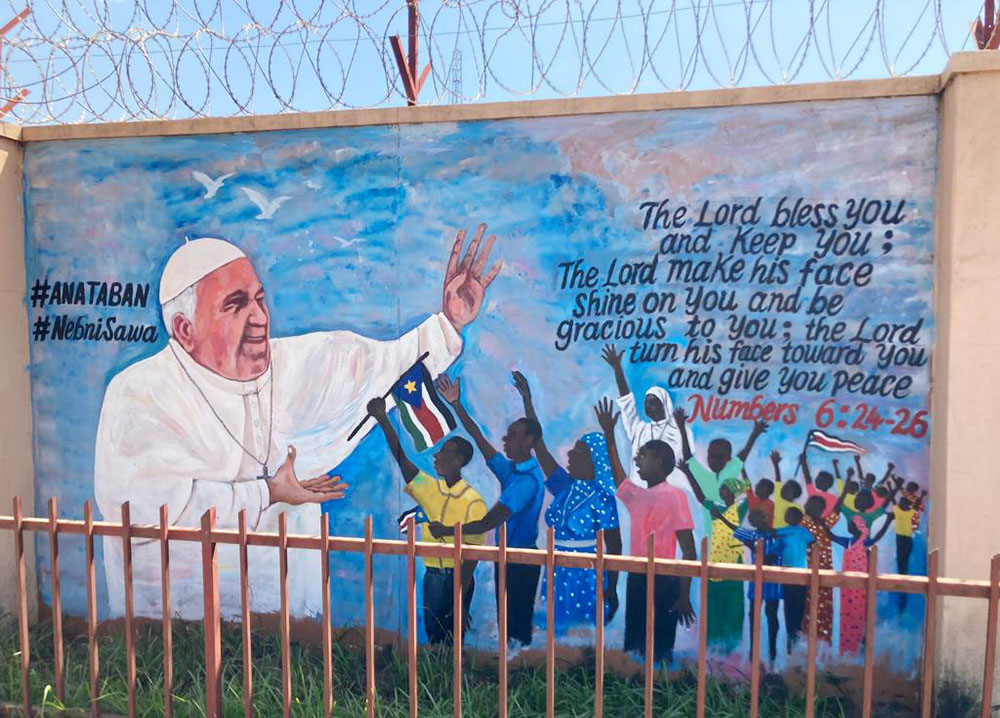
A mural of Pope Francis is painted on the walls of the South Sudan Council of Churches in Juba, ahead of an ecumenical Feb. 3-5 peace pilgrimage. (Elizabeth Boyle)
A few yards from South Sudan's presidential palace in Juba sits the South Sudan Council of Churches, an ecumenical organization formed soon after the country's independence in 2011, and dedicated to peacebuilding in a country where its efforts have repeatedly been frustrated over the last decade.
Several weeks ago, President Salva Kiir's vehicle came to a halt and he lowered his windows to take in the new murals on the outside of the council's headquarters.
"Bear with each other and forgive one another, if any of you has a grievance against someone forgive as the Lord forgave you," reads the text from Colossians, painted next to the official logo of the upcoming ecumenical visit of the archbishop of Canterbury, the moderator of the General Assembly of the Church of Scotland, and Pope Francis, whose face was painted on another of the building's murals.
Perhaps as Kiir observed the murals, he recalled another iconic scene when in 2019 Francis knelt at Kiir's feet and literally begged him, and other members of the country's fractured leadership taking part in an ecumenical spiritual retreat at the Vatican, not to return to its bloody civil war.
Advertisement
From Jan. 31 to Feb. 5, peace will top the pope's agenda as he embarks on the 40th international journey of his papacy, first to the Democratic Republic of Congo and then, alongside the leader of the world's Anglican Communion and the moderator of the Church of Scotland, to South Sudan in a first-of-its-kind joint ecumenical visit.
"The time has matured," said Archbishop Ian Ernest, director of the Anglican Centre in Rome and the personal representative of the archbishop of Canterbury to the Holy See. Ernest described the trip as "historical."
"This is a pilgrimage of peace," he told NCR. "Now is the moment of conversion."
Congo: 'Synthesis of the pope's magisterium'
When Francis sets foot in the Democratic Republic of Congo's capital of Kinshasa on Jan. 31, he will arrive in a land rich in natural resources, yet beset by poverty and haunted by its not-so-distant history.
Just over a century ago, forced labor claimed an estimated 8 million to 10 million Congolese lives, leading to what has been called a forgotten holocaust. In 1960, the country gained independence, and now the former Belgian colony in central Africa is the continent's most populous Catholic country, with nearly half of its 95 million inhabitants professing the faith.
The country's fragile governance has been buttressed in recent years by the Catholic Church, where in 2019, the Congolese bishops' conference deployed some 40,000 election monitors during the presidential election in an effort to limit the corruption and bloodshed that had defined previous elections.
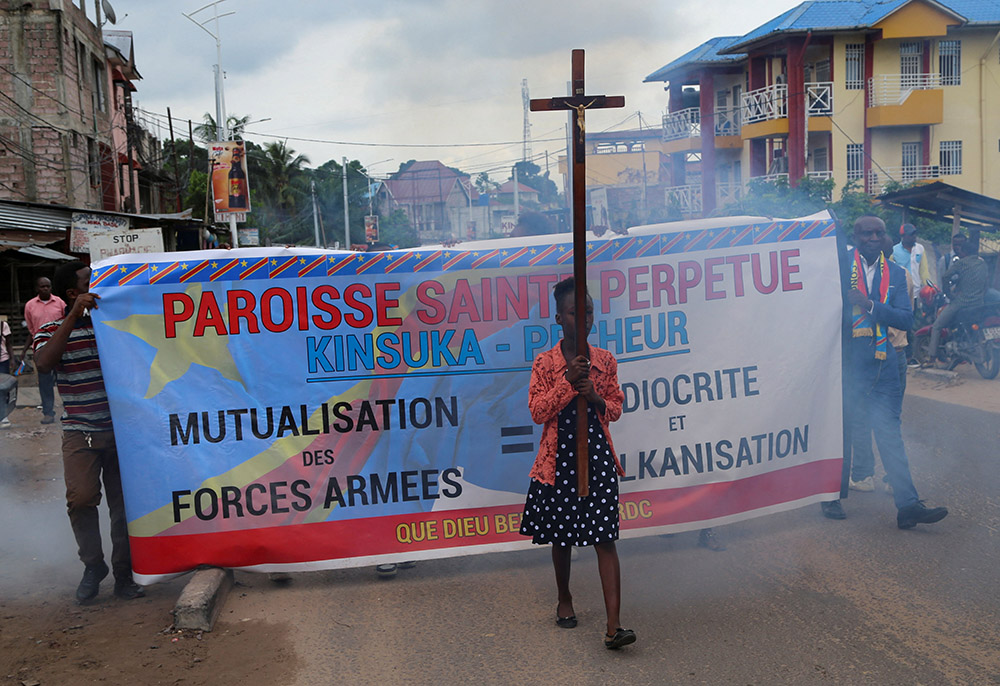
A young woman carries a cross during a march in Kinshasa, Democratic Republic of Congo, to protest escalating violence in the country, Dec. 4, 2022. (CNS/Reuters/Justin Makangara)
St. Andrew Sr. Josée Ngalula, who serves in Kinshasa, told NCR, "The present political situation is marked by a fight on all fronts to stabilize the country: efforts to put an end to the war and the suffering of the population in war and insecurity zones, efforts to improve the social situation of all Congolese, efforts to put an end to corruption."
In the midst of such political and socioeconomic instability — and with another election looming later this year — Ngalula said that Africa's second-largest country will welcome Francis "as a pilgrim who comes to bring a message of comfort and peace because the Democratic Republic of Congo is the victim of an unjust war that has been causing innocent people to suffer for about 25 years."
Since the 1994 genocide in neighboring Rwanda, more than 100 armed groups have waged war against each other, as Congo has sought to manage a massive spillover of refugees and to navigate both internal and external battles over its bounty of natural resources.
"We welcome Pope Francis as a spiritual authority who has chosen to put himself in the camp of the victims of human wickedness, to say to the world: 'Do not shed the blood of the innocent; may justice reign in this country and in the world,' " said Ngalula, who serves on the Vatican's International Theological Commission.
During his three-day visit, Francis will meet with victims of the bloodshed, along with agencies on the front lines working toward peace, and will celebrate a Mass for more than a million Catholics.
"Congo can be the synthesis of the pope's magisterium," Congolese Jesuit Fr. Jacques Nzumbu told NCR.
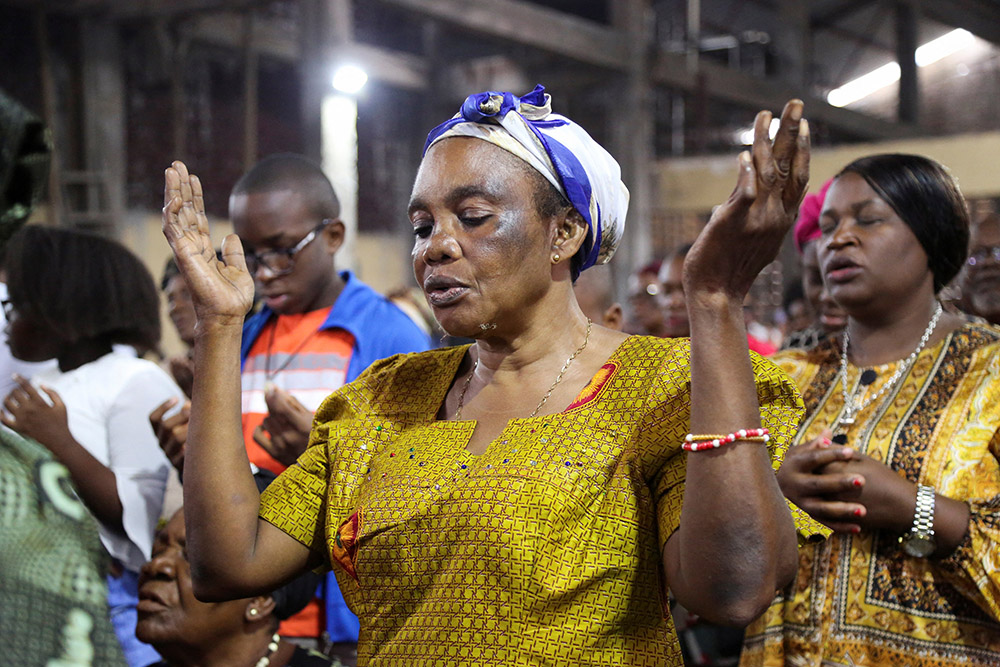
A woman prays during morning Mass at St. Charles Church in Kinshasa, Congo, Jan. 22. (OSV News/Reuters/Justin Makangara)
Reflecting on the major documents released during Francis' decadelong papacy, Nzumbu said the church's commitment to social movements and involvement in the country's education system and hospitals give witness to what Francis describes in his first encyclical, "The Light of Faith."
The liveliness and the enthusiasm of Congolese worship, Nzumbu said, attest to Francis' apostolic exhortation "The Joy of the Gospel" and the importance of safeguarding the country's natural resources is underscored in "Laudato Si', on Care for Our Common Home."
"From Congo, he can say something for the world, not only for the Congo," said Nzumbu.
South Sudan: 'Without this trip, nothing is going to get better'
Earlier this month, Missionaries of Africa Fr. Jim Greene attended the installation of Bishop Emmanuel Bernardino in Torit, South Sudan, a rare occasion where the country's road conditions proved safe enough for travel and all of the country's Catholic bishops were present under the same roof.
"A quiet work has been going on here in the last three years," Greene told NCR. "Every diocese in the country now has its bishops, whereas when I arrived in the country, in 2019, there were only three dioceses that had acting bishops."
For Greene, the executive director of Solidarity With South Sudan, an organization representing more than 400 religious congregations with an aim of responding to the immediate needs of the country, the ordination served as a sign of hope and proof that with perseverance, the church — and the country — can successfully work toward the future.
Despite being the world's youngest country, that future has often seemed hard to imagine.
In 2011, nearly 99% of South Sudanese voted for independence. Yet just two years later, the country was engulfed in a vicious civil war after a rift between its president, Kiir, and his vice president and political rival, Riek Machar.
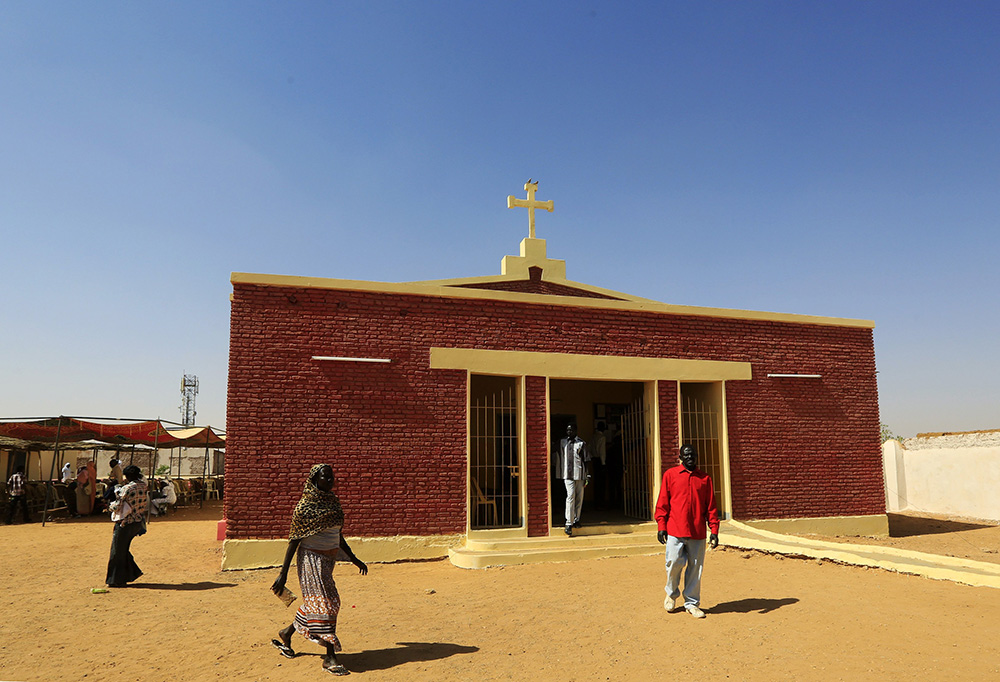
South Sudanese walk near a Catholic church in Omdurman, Sudan. (CNS/Reuters/Mohamed Nureldin Abdallah)
The civil war — which wreaked ongoing political and economic havoc throughout the nation and left an estimated 400,000 dead and 4 million displaced — lasted until 2020. Kiir and Machar now lead a fragile coalition government in an effort aimed at national unity.
Over the decade, religious leaders have been on the front lines trying to hold together a delicate peace accord. Catholics, Anglicans and Presbyterians make up the three largest branches, and ecumenical efforts have tried to serve as a ballast against continued political infighting.
Following the historic 2019 religious retreat at the Vatican, the country's leaders entered into a peace agreement, which pledged a ceasefire in the country, outlined internal mechanisms to resolve hostilities, and guaranteed that humanitarian organizations would be allowed to work within the country.
While conditions in the capital of Juba — where Francis, Archbishop of Canterbury Justin Welby and Moderator Iain Greenshields will spend three days — have significantly improved, peace throughout the country is tenuous, at best.
Those involved in the organization of the trip are quick to note that they have no delusions that peace will arrive overnight, but according to Greene, the visit will demonstrate that "there is a desire for this lasting, durable peace in every corner."
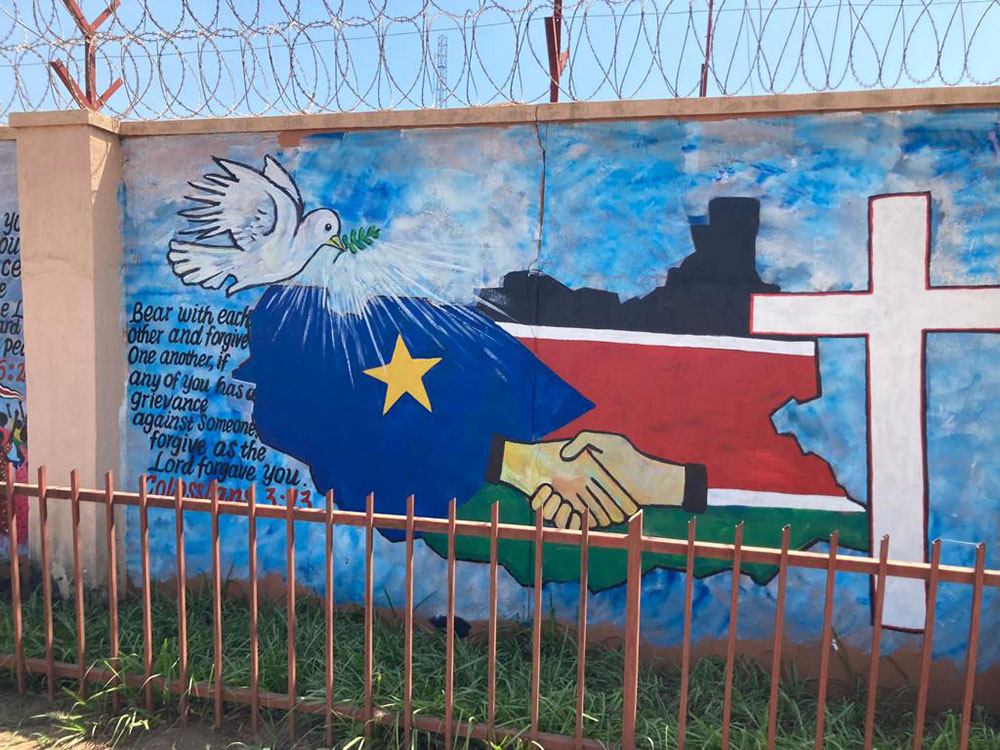
A mural with the official logo of the ecumenical peace pilgrimage to South Sudan is painted on the walls of the South Sudan Council of Churches in Juba. (Elizabeth Boyle)
Chris Trott, the British ambassador to the Holy See who previously served in South Sudan, told journalists ahead of the trip that he hopes the ecumenical visit nudges the country's political leaders to recognize the essential role civil society must play in South Sudan if peace is to succeed.
"If you only ever include people with guns at the table, you will get more and more people with guns," said Trott, recalling the United Kingdom's insistence that civil society be a part of peace negotiations.
"I know that without this trip, nothing is going to get better," he said. "I know that without this trip, the political leaders are going to continue to dig in and the voices of civil society will get weaker and weaker."
Elizabeth Boyle, international relations officer for the Community of Sant'Egidio, a lay-led Catholic social service organization that helped broker the consequential 2020 peace agreement in Rome, concurred. "It's not necessarily that this visit will bring peace in and of itself, but it's a fulfillment of a promise and that means something for the people of South Sudan," she said.
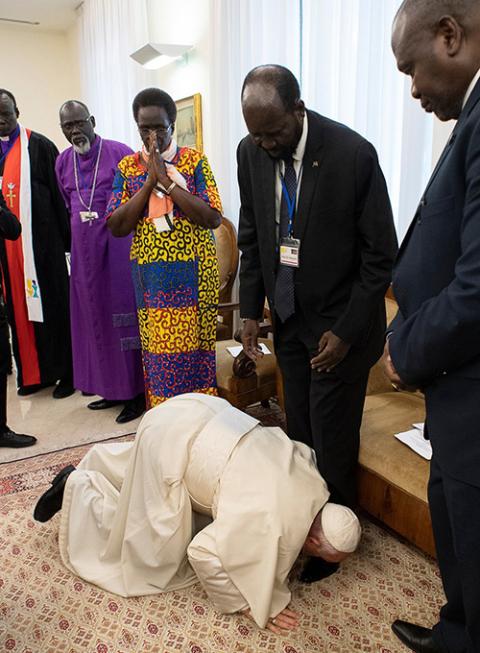
Pope Francis kisses the feet of South Sudan President Salva Kiir at the Vatican April 11, 2019. (CNS/Vatican Media via Reuters)
Reflecting back on the 2019 spiritual retreat at the Vatican when the pope begged for peace — a moment Kiir later said caused him to tremble — Boyle said the ecumenical visit is a "realization" of that retreat.
"It was a promise from the religious leaders and a commitment on their part to following and supporting both spiritually and in person the work for peace in South Sudan," she told NCR. "In this time of war in Europe, it's a clear signal that the pope, the archbishop and the moderator are deeply committed to seeing peace not only here in Europe but also on the African continent, and particularly in South Sudan."
During the visit, the three church leaders will participate in a joint prayer service and hold meetings with the country's political leaders, as well as with internally displaced persons to hear firsthand testimonies of the effects of war.
While the trip had been originally scheduled for July 2022, Francis' mobility issues forced him to cancel the visit. Now, the 86-year-old pope, who continues to struggle with severe knee pain, is about to undertake one of the most strenuous trips of his papacy to further underscore his desire for a lasting peace.
"This is a public symbol that we cannot give up on this country and these people," said Boyle.

